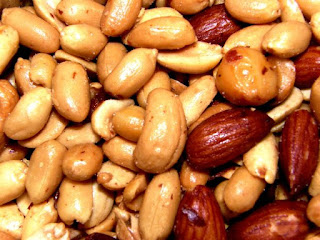- Peanuts go by a number of names, including groundnuts, earthnuts, goobers, pinders, Manila nuts and monkey nuts. The Latin name for them is Arachis hypogaea.
- They're not actually nuts at all, but legumes, belonging to the same family as soybeans, chickpeas, Peas, Clover, Liquorice, and Lentils.
- They are native to South America, where pre-Columbian cultures, such as the Moche, depicted peanuts in their art. Peanut shells dating back 7,600 years have been found in Peru. Peanuts were on sale in Mesoamerica when the Spanish arrived and from there, they spread throughout the world.
- The country which produces the most peanuts is China, followed by India, Nigeria and the United States, where the major peanut producing states are Georgia, Texas, Alabama, North Carolina, Florida, Oklahoma, Virginia, New Mexico and South Carolina.
- There are four different types of peanut which can be bought in the shops: Spanish, Runner, Virginia, and Valencia.
- Two former American presidents were peanut farmers - Thomas Jefferson and Jimmy Carter. Jimmy Carter's parents had a 360-acre peanut farm; Carter sold peanuts on the streets when he was just five years old.
- The person who holds the record for peanut throwing is Colin Jackson, a former world champion hurdler from the UK. He threw a peanut 37.92 meters (or 124 feet, four inches) in Cardiff in February 2008.
- Peanuts are a major source of protein and also contain minerals, antioxidants, and vitamins. They're also cholesterol free. Because they are such a great source of protein, peanut paste is used by the United Nations to feed malnourished children in developing countries.
- That said, about 0.6% of people in the US have peanut allergies which can be fatal in severe cases. There are enough people with these severe allergies to cause airlines and schools to ban peanuts altogether. There is a theory that if peanuts are introduced into a child's diet early on they are less likely to develop a fatal allergy. In Israel, there is a very low rate of peanut allergy, and it has been hypothesised that this is because there's a puffed peanut snack there which is very popular with small children. Another theory is that food allergies in general are less likely if children are exposed to dirt and germs when they are young.
- Peanuts aren't just for eating. Peanut oil is used to make paint, varnish, lubricating oil, leather dressings, furniture polish, insecticides, and nitroglycerin. The shells are used to make plastic, wallboard, abrasives, fuel, rayon, Paper and glue. If you buy peanuts in the shell you can recycle the shells into cat litter, kindling, packing material or compost.
More details about my books. Follow this link if you like Superheroes, Psychics and/or quirky short stories.
I've listed the themes each novel touches on here for easy reference.
Like my author page on Facebook for news on new books and blog posts.
Check out my Writing blog


No comments:
Post a Comment